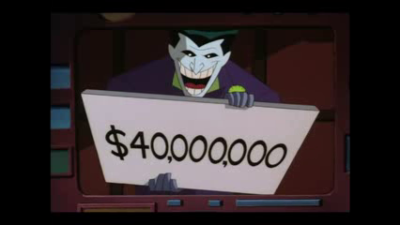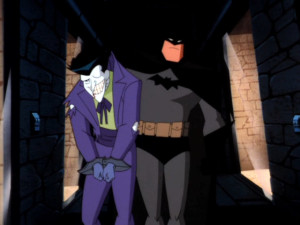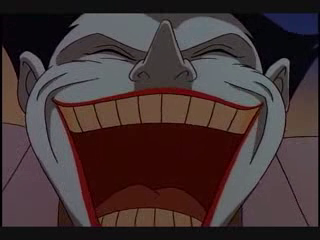Report #005
The Joker – Batman: The Animated Series
♦ Batman: The Animated Series synopsis/summary:
The Joker is a fan-favorite among Batman’s Rogues’ Gallery. This is a feat, considering all the villains the Dark Knight faces are iconic. There’s not much to summarize. I’ve talked about most of the episodes in Joker’s Villain Matrix Score post. That said, we can jump into the meat of the matter: Understanding Joker.

♦ Analysis:
What is it about Joker that makes him so fascinating? If we met him in real life, we’d be terrified. If you’re a normal Gothamite, you’re probably not in much danger, other than when he conducts his mass-casualty attacks or threatens the city in general. If you attract his individual attention, though, you can’t be sure what you’re in for. He might kill you, he might not. When he takes a hostage, it’s either to teach the person a lesson/kill them, such as when he kidnapped Mayor Hill after the politician offended Joker, or to lure Batman into another “game.” This unpredictability makes him a villain you don’t want to cross.
Origin stories: Seeds of redemption:
We’re not given a true origin story for Joker in Batman:tAS. He believes Batman is responsible for his current state (“making me the happy soul I am”), but the rest of the information is need-to-know, evidently. And the viewers don’t need to know. It’s not relevant to the show, as the writers have deemed him irredeemable.
Everybody else has a backstory – from Killer Croc to the Riddler. Backstories build viewer sympathy or at least empathy, as we can understand now where the baddy came from. Knowing that the villain experienced a bad childhood and was mistreated, or had their greenhouse burned down by men as in the case of Poison Ivy, makes their actions more understandable. If we know that Ivy’s dislike of men stems from this trauma, we rationalize that she’s not just a person who decided to randomly take up a grudge against men and humanity. There’s less evil and more justice in her actions then, even if that justice is skewed. We can understand grudges. We can understand people trying to make society right, even if it’s their own version of right, such as Ras Al Ghul’s plans to “save” the earth.
But Joker? No, no idea what his underlying issue is. This makes him inscrutable, a mystery of motivation. We know what his goal is to live large, get attention, and take down Batman. We just don’t know why. So we have no choice but to chalk up his schemes to being malicious, cruel, and mentally unstable. He is a true villain.

In real life, we often judge people on face value. We don’t see the point of looking deeper. I can understand this. I don’t care what deep-seated personal issue means you can’t master a task at work or why you give me an attitude when I ask you to perform one of your job functions. If you need more training, I can help you. Beyond that, I can’t. But this is a fallacy. If I look deeper, I might see that the employee who’s making me tear my hair out from frustration has a home situation that preoccupies her. In which case, I might be able to offer advice. Or maybe I can suggest a schedule change or office-location transfer.
Knowing a person’s underlying problems/challenges helps us help them. But there is of course a limit. In the work place, we’re expected to leave our home problems at the door so they don’t become work problems. Patience and understanding are all wonderful, but there’s a limit to everything. If, for example, you’re using intoxicating/illicit substances on the job in order to “cope” with your issues, well…the authorities will be able to help you with that, perhaps. Batman oftentimes understands villains’ motives, but right and wrong is still clear. Ah, but that’s a Batman post, one for another time.
In summary, knowing a person’s motives and driving issues makes us more sympathetic. We fear, hate, or at least dislike what we can’t understand, because it’s a threat on a primal level. Do what you can to understand people, rather than simply judging them on the face value of their actions. And remember, we all have bad days. We can all change, too.
Goals: Not just for sports:

Back to the Joker: His goals in life lack sustainability, and many aspects aren’t quantifiable. Let me explain. He wants to live large and get attention. How do you measure if he’s achieved these? They both lack ceilings. What will he ever consider large enough? What will he consider enough attention? Like most of us, nothing is ever good enough for him. There’s always more. Which is a good thing, to a point. Where these types of goals fall short is in their sustainability. If your goal involves a quantity that needs to constantly increase – be it fame, fortune, adrenaline, pleasure – you eventually plateau. It’s impossible for any of these things to constantly, steadily increase. It’s like a drug: tolerance develops and you need more, but eventually you reach the upper limit. You want more, but you can’t take or get more. These goals leave their owners with a constant hunger for more, rather than satisfaction with a job well done.
Now, I’m not saying you should ever be satisfied with the status quo. There’s always room for improvement. But that increase shouldn’t be the goal in itself. What does the increase of, say, quality mean? What are you working toward? I’m by no means implying that these types of goals are inferior or shouldn’t be pursued. I simply believe you should be aware of the drawbacks. Choose your unquantifiable quantity carefully. Let it be something like knowledge, skill, or precision, which are internal, rather than external objects such as wealth or fans.
Another goal that isn’t sustainable is Joker’s quest to defeat Batman. This is the exact opposite of his other goals in that it is a one-and-done deal. Defeating Bats is momentarily exhilarating and satisfying, but then comes the letdown feeling you get after all the Christmas presents are open and you’re left with a mess and a pile of materialism. Joker has no plan for what comes after. I assume it involves going about his schemes to rob everyone in Gotham or embarrass the top brass. But a large reason why these are
exciting for Joker is due to Batman’s opposition. It’s just no fun if Bats doesn’t show up.

Having a goal with a definite end point is excellent. It can be “graduate from college,” “get a job with X company,” “win X competition,” etc. Just remember that if you achieve it, you need to have a plan afterward. You also need to have a goal that is achievable. If not, then you’re just asking for disappointment. Remember too not to tie your self worth to your goal. If you do, you’ll either hate yourself for not reaching the goal, or you’ll begin to doubt yourself after you’ve achieved it, because the glory will fade. Life is an ongoing adventure, not a single quest. Take the long view. Plan for failure, but more importantly plan for success. What happens after you graduate, get the job, win the competition, etc?
In the end:
Joker embodies the excitement and spontaneity we want in life. Getting people to laugh at our jokes, pay attention to our actions, and give us money are things we love. But Joker comes with a whole deck of mental illnesses and flaws. I haven’t even touched his relationship with Harley, but I think you already know that goes. While “extreme” is his goal, it usually goes out of control. He lives for the thrill, but how long can it continue? He’s in and out of Arkham practically weekly. He’s easily bored. His main source of joy and entertainment is fighting a man in a bat suit. He is one of the Greats of Villainy, but he’s not one who’s shoes I’d wanna walk in. Clown shoes don’t look good on me.
♦ What does the Joker represent?
Villains embody themes, morals, warnings, dangers. They are symbols and parables that help us live better.
So what about the Joker? This is just my opinion, but I believe he embodies a number of themes:
- The result of seeking fame.
- The outworking of antisocial personality disorder and possibly borderline personality disorder.
- The danger of becoming obsessed with one goal.
- The results of lacking restraint.
- The danger of desiring thrills.
- The danger of pride.
- the result of spontaneity gone wrong.
This isn’t exhaustive, of course.
♦ What the Joker teaches us about how to succeed in life:
Smile! It makes you feel better and confuses people.
Laugh! Mostly laugh at yourself, but laugh with others too.
Stay positive. Life seems dead set on getting us down. Don’t let it.
Dress the part. If you wanna be a clown, wear the costume. Don’t expect people to take you seriously otherwise.
Hire like-minded people. If you have a project to complete, make sure the people who are helping share your vision.
Challenge yourself. Life gets dull if you stay in a rut, even if it is an easy rut.
Have fun. You have to make your own good time. Get out and do it!
Be resilient; get back in there! Why are you letting people or situations defeat you?
Make your own opportunities. They’re often disguised as hard work, too.
Escape whenever possible. Be it through entertainment or travel or art or socialization, be sure to escape the mundane.
Choose your goals wisely. Preferably pick some you can achieve.
Understand people’s backstory before you judge. You have one too.
Think in unique ways. Practice makes perfect here.
Don’t be so serious. Nobody gets out of this thing alive!
♦ Mach(iavelli) Tip:
“Of mankind we may say in general they are fickle, hypocritical, and greedy of gain.“
♦ Tzu Tip:
“Thus it is that in war the victorious strategist only seeks battle after the victory has been won, whereas he who is destined to defeat first fights and afterwards looks for victory.”
♦ Further reading:
How to be Villainously Positive: 18 ways with the Joker
Villainous Resilience: 15 Ways to bounce back like the Joker
Villainous opportunism: How to take advantage of every opportunity, Albert Wesker-style
Quit Like a Pro: 14 Signs You Should Ditch Your Job – With Albert Wesker
Villains vs Antagonists: A field guide
♦ TV Tropes:
The Joker
Agree? Disagree? Let us know in the comments. Perform your own villain assessments with the Villain Matrix. Use the Villain Matrix spreadsheet that comes free when you join the Research Team, where you’ll also get our newsletter with its exclusive updates and content.
(*Affiliate link, meaning you get a movie/DVD/book/game/whatever, I get a few pennies, and everybody’s happy!)
